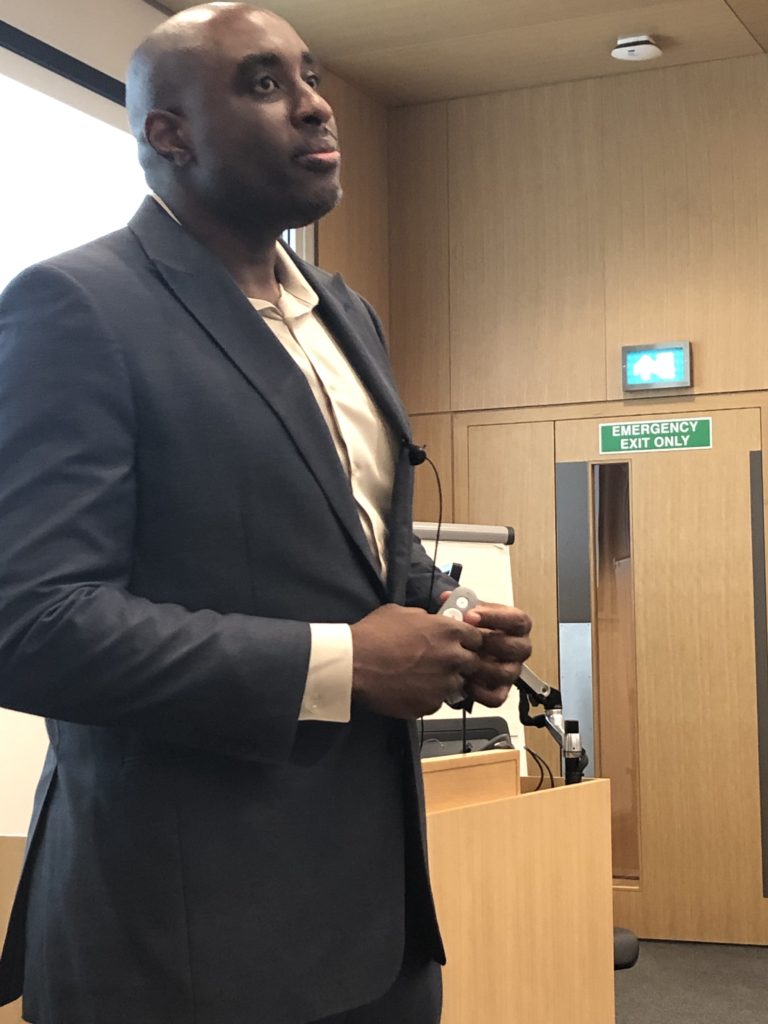
The Social Ideas Podcast
The Social Ideas Podcast shares the impact of social innovation, its necessity and its capacity to challenge the status quo. Throughout this series, highly committed change makers in business, civil society, policy and academia will talk about their work, their ideas and their motivation to strive towards to a more equitable and sustainable world.
Black History Month
In the UK, October was first designated Black History month in 1987, with the desire and aim to commemorate the contribution, work, lives and identity of the UK’s Black communities.
Dr Leon Prieto
There is a term from the Akan people of Ghana known as Sankofa, which means, “go back and get it.” It embodies the importance of reflecting on African philosophies from the past in order to reclaim the future (Prieto & Phipps, 2019: 1) [1]. In June 2019, I was a guest lecturer for the Cambridge Centre for Social Innovation’s MSt in Social Innovation students. As the Heritage Bank University Professor & Associate Professor of Management at Clayton State University, in Georgia, US, my talk featured the hidden figures of Black business, and was based on my recently published book, African American Management History: Insights on Gaining a Cooperative Advantage [2]: I co-authored the book with Dr. Simone Phipps, Associate Professor of Management at Middle Georgia State University.

The hidden figures of Black business
My favorite hidden figure is Charles Clinton Spaulding (1874-1952), who managed America’s largest black business, the North Carolina Mutual Life Insurance Company from 1900 to 1952. What was inspirational about Spaulding was that he was also a social entrepreneur who wrote extensively about the need for black businesses to give back to their communities, and he stressed the importance of cooperation among African Americans, which embodied traditions from Africa.
Successful business leaders always have their own compelling philosophies, but all too often, the thoughts and ideologies of pioneering black business leaders are forgotten or passed over. The ideas and practices of these visionary leaders, sometimes heralded within their own communities, are often ignored by mainstream media due to a legacy of racism that has effectively written many black men and women out of history. Despite the widespread discrimination and hardship faced by African Americans, there were those who persevered to become successful business owners and social entrepreneurs within their communities; it is this dogged determination and belief in the success of community that makes the history of African American management an educational necessity for management and social entrepreneurship scholars and practitioners, giving them the opportunity to draw attention to the works of individuals such as Charles Clinton Spaulding who have made a significant impact on their communities, and the corporate world. Reflecting on the legacy of Spaulding and other black business pioneers can teach contemporary social entrepreneurs that they too can gain a “cooperative advantage” if they focus on uplifting their community instead of solely focusing on making a profit.
Social service in business
John Merrick, Alonzo Herndon, Charles Clinton Spaulding, Annie Turnbo-Malone, Madame C.J. Walker, and Maggie Lena Walker are names you might not have heard of but their legacy as African American business leaders and social entrepreneurs is firmly cemented in their founding and development of companies with a strong social mission e.g. North Carolina Mutual Life Insurance Company, Atlanta Life Insurance Company, Poro, Madame C.J. Walker Manufacturing Company, and St. Luke Penny Savings Bank, etc. These black business pioneers created tens of thousands of jobs and uplifted the black community. As I have discussed before, “Charles Clinton Spaulding, the Father of African American Management was also known as “Mr. Cooperation”, due to his belief in the power of cooperation to build his company and positively serve his community.”
As previously mentioned, Spaulding was a thought leader in the early 20th century, and in an article written in 1937, he conceptualised four cardinal points of entrepreneurship, and listed social service in business as an important principle for individuals to adhere to. Spaulding saw the need for black businesses to focus on being committed to serving their communities instead of just focusing on making a profit because he saw firsthand the challenges faced by blacks in the United States, and how many of them lacked opportunities and basic services. He saw black businesses as the solution to those problems.
I am, because we are
Ubuntu, which can be translated to mean, “I am, because we are”, embodies the spirit of cooperation within many African societies; and, during my lecture to the MSt in Social Innovation students, I suggested that present-day businesses and social enterprises should adopt this philosophy to gain a cooperative advantage. There are many similarities between the philosophies of Umuganda (Rwanda), Harambee (Kenya), Gayap (Trinidad & Tobago), Ujamaa (Tanzania), and Ubuntu (South Africa), and, a number of the traditional systems of cooperation linked to these philosophies from sub-Saharan African societies survived the middle passage into the Americas.
Building off the work of Bangura (2005) [3], Dr Phipps and I (2019, p. 12) [4] defined cooperative advantage as the benefits that an organisation possesses and accrues due to its people-centric approach to engendering spirituality, consensus building, and dialogue for the benefit of the employees, customers, and community. Dr. Prieto also pointed out that Black Management and Social Entrepreneurship in the late 19th century and early 20th century in the United States has its roots in traditional philosophies of cooperation, which garnered support in black churches and mutual aid societies, and that social entrepreneurship was practiced by successful black business leaders in the early 20th century as a way to create jobs and transform communities.
Gaining a cooperative advantage
In order for contemporary social entrepreneurs and business leaders to regain a cooperative advantage they need to promote spirituality, consensus-building, and dialogue just like the black business pioneers of yesteryear. Through my research I found points of advice and guidance that I shared during my talk:
- Spirituality: The philosophy of Ubuntu calls for business leaders & social entrepreneurs to attend to the “spiritual” needs of the people (employees, customers, community) they serve (Nafukho, Wawire & Mungania-Lam, 2011) [5]. This can be achieved by engendering a spirit of caring and community within and outside the organization, and a commitment to creating meaningful work for employees and promoting the welfare of the local community.
- Consensus-building: In order to gain a cooperative advantage utilizing the philosophy of Ubuntu, managers and social entrepreneurs should listen to the opinions of employees, customers, and other stakeholders. For example, the organization should have periodic meetings with representatives of the community they serve in order to determine how they will better serve their needs.
- Dialogue: In order to achieve a cooperative advantage, business leaders and social entrepreneurs should play a role in promoting meaningful and authentic dialogue in order to develop a culture that embraces learning from others, and to find solutions to various problems facing the organization and the community.
Present day Black social entrepreneurs
Thankfully, there are black social entrepreneurs who are currently making a difference in their respective communities. During my presentation, I mentioned Amber Scott, Founder and Executive Director of Leap Year, a social enterprise building the next generation of high impact leaders by providing first generation students with the support they need to succeed in college and service. Also discussed was Rony Delgarde, President and CEO of Global Paint for Charity, a social enterprise that is committed to collecting and packaging discarded latex paint products from businesses, residents and manufacturers that would otherwise end up in the waste stream; these products are then distributed to charities and vulnerable individuals in developing countries in Africa, Caribbean, Asia and Central America, as well as nationally under-served communities in the United States.
Moving forward
Opportunities are limitless for present-day and future black social entrepreneurs and socially conscious business leaders; however, as my lecture drew to a close, I felt it was important to state that the major challenge facing those individuals is limited access to capital, as too much emphasis is often placed on traditional methods of financing a business or a social enterprise. This can be problematic because individuals, and especially people of African descent, are often denied funding due to various factors such as lack of collateral or discrimination. Other techniques, including bootstrapping (starting an enterprise with a limited budget), should also be extensively examined as they may help potential black social entrepreneurs obtain the necessary resources they need to launch and successfully manage their enterprises. Finally, I mentioned that people of African descent may also want to consider forming cooperatives to tackle some of the major issues facing the black community.
The Social Ideas Podcast: I am, because we are
The Social Ideas Podcast shares the impact of social innovation, its necessity and its capacity to challenge the status quo. Throughout this series, highly committed change makers in business, civil society, policy and academia will talk about their work, their ideas and their motivation to strive towards to a more equitable and sustainable world.
Resources
[1] Prieto, L. C., & Phipps, S. T. A. (2019). African American Management History: Insights on Gaining a Cooperative Advantage. Bingley, UK: Emerald Publishing Limited.
[2] Bangura, A. K. (2005). Ubuntugogy: An African educational paradigm that transcends pedagogy, andragogy, ergonagy and heutagogy, Journal of Third World Studies, 22(2), pp. 13-54.
[3] Nafukho, F. M., Wawire, N. H. W., & Mungania-Lam, P. M. (2011), Management of adult education organizations in Africa. Pearson Education/UNESCO, Cape Town, South Africa.


Leave a Reply